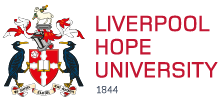
Liverpool Hope University pursues a path of excellence in scholarship and collegial life without reservation or hesitation. The University’s distinctive philosophy is to ‘educate in the round’ – mind, body and spirit – in the quest for Truth, Beauty and Goodness.
Liverpool Hope University is distinctive in that it is the only university foundation in Europe (and the USA) where Catholic and Anglican colleges have come together to form an integrated, ecumenical, Christian foundation.
It has happened in Liverpool and nowhere else in Europe largely because of the presence in the 1980s of two remarkable church leaders: Bishop David Sheppard, the Bishop of the Anglican Diocese, and Archbishop Derek Worlock, the Archbishop of the Catholic Archdiocese that extends from Liverpool across the north of England.
They confessed their faith to each other and took their congregations to visit each other’s cathedrals, a symbolic act of Christians working together in the context of northern Irish religious sectarianism.
When the three colleges (St Katharine’s 1844, Notre Dame College 1856 and Christ’s College 1964) came together the name ‘Hope’ was adopted came from Hope Street that links both cathedrals - a real example of what can happen when people unite and work together for the common good.
In 2019 we celebrated 175 years since the founding of our first college in 1844; in that year there were only six universities in England (two of them medieval) but all of them did not admit women, Catholics or Jews. The founding colleges of Liverpool Hope University were among the first few institutions to begin opening up higher education to the vast majority of England’s population.
The Anglican Bishops of Liverpool, going back to the founding Bishop, Bishop Ryle, were all evangelicals. The friendship of the Anglican Bishop and the Catholic Archbishop was largely based on both their sharing of a mutual faith and their commitment to the poor. This adherence to historic Christian faith remains the university’s own commitment as it seeks to live out that faith in its life and work in a secularised British academy.
At the beginning of each academic term we hold a Foundation Service to restate our foundational mission and values. Our Graduation ceremonies are held in alternating years in both the Anglican and Catholic Cathedrals in Liverpool.
The new name of Liverpool Hope University was chosen to represent the ecumenical mission of the Institution. Liverpool Hope University was born in July 2005, when the Privy Council bestowed the right to use the University title. Research Degree Awarding Powers were granted by the Privy Council in 2009.
Governance
The governing body of Liverpool Hope University is its University Council. As the University is a company limited by guarantee and a registered charity, members of University Council are also the company directors and charity trustees. The Council discharges its duties in accordance with the Higher Education Code of Governance.
University Council is responsible for maintaining the educational character of the institution and the promotion of its Mission and Values. University Council is chaired by the Pro Chancellor, Revd Canon Peter Winn.

Our cutting-edge game art and design programme is meticulously crafted to set you apart in the vibrant world of gaming. Designed by industry leaders and visionaries, our curriculum is a fusion of artistry and technology, offering a comprehensive exploration into the creation of stunning game visual...

Our Tourism Management degree is designed to get under the skin of the tourism industry by examining its various operational components. These include accommodation, transport and attraction sectors, in addition to examining the policy and planning frameworks that facilitate tourism development.

The postgraduate programme in Early Childhood is designed for early years teachers/educators and others with a personal and a professional interest in the field of early childhood studies.

The postgraduate programme in Advanced Mentoring and Coaching is designed for those with a personal and a professional interest in the field of mentoring and coaching including teachers, educators and leaders. The programme offers an opportunity for engagement with the key theories, concepts and ...

The full-time course is particularly intensive. Students are timetabled for study across a number of areas including initial professional development covering principles of education and curriculum areas such as English, Mathematics, Science, ICT, History, Geography, Art, Music, P.E and R.E.
© 2025 coursetakers.com All Rights Reserved. Terms and Conditions of use | Privacy Policy